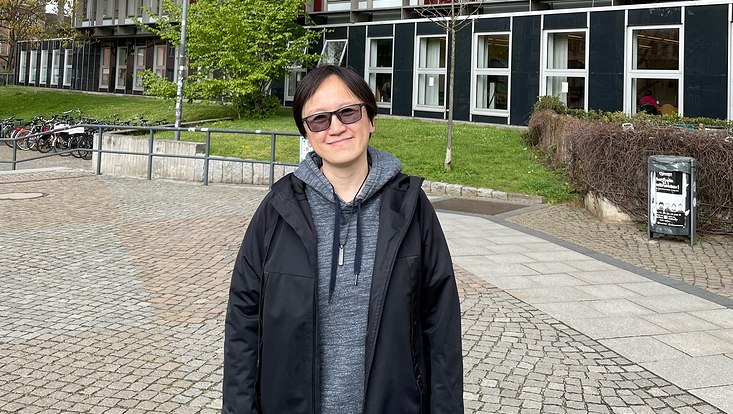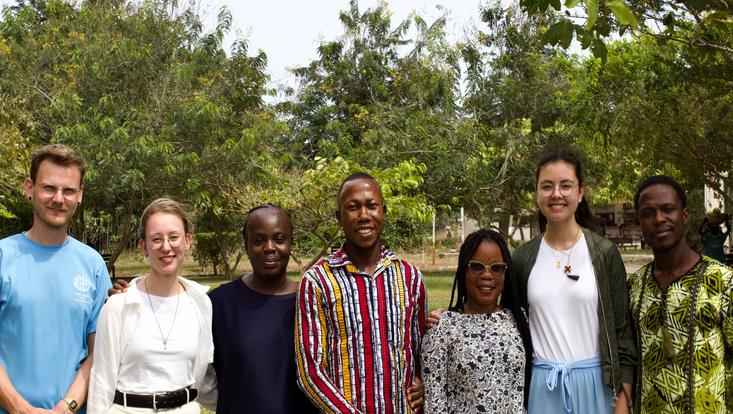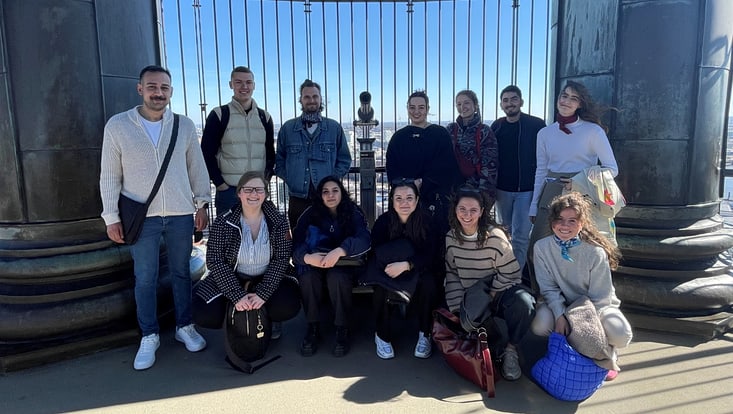"I look forward to really immersing myself in the language and culture"
14. Juni 2023

Foto: UHH/Referat Internationalisierung
Ju-Hui Wei ist Doktorandin an der National Sun-Yat-sen University in Taiwan. Im Rahmen einer Förderung des DAAD/MOST SANDWICH SCHOLARSHIP PROGRAMMS ist sie von April 2023 bis Januar 2024 an der Fakultät für Erziehungswissenschaft um an ihrer Promotion zu arbeiten. Ju-Hui hat einen Master in Physik, einen MBA und mehrere Jahre Lehrerfahrung. Sie forscht derzeit zum Einfluss multikultureller Erfahrungen und kultureller Diversität auf die Kreativität von Lehrenden. Wir sprachen mit Ihr über Ihre Doktorarbeit und über ihre ersten Eindrücke von Hamburg.
Hi Ju-Hui, thank you for agreeing to do an interview with us about your stay at UHH.
How was your arrival in Germany and Hamburg and what is your first expression of the city and of the university?
Hamburg is not my first stop in Germany. I was able to attend a DAAD sponsored German class in Freiburg and Bonn prior to my arrival here. Hamburg certainly seems different and a lot bigger and I have only just begun to explore my neighborhood. I still have to venture out further to see more of the city. When arriving in southern Germany, I tried applying my German knowledge right away but, maybe because my German is not good enough yet, people sometimes answered in English. Now, in Hamburg, people I met so far are always patient and they allowed me to try out my abilities, which I appreciated!
While exploring the campus one weekend, I was amazed by how empty it was. In Taiwan, there are always people on Campus, as they live close by. Here, it seemed like people kind of disappear in the evening as compared to Taiwan, where it will get busy at night, as people go out for dinner.
That is certainly a difference in campus life! May I ask, why you decided to come to Germany during your PhD?
I really wanted to work with Professor Gogolin, whom I met at an online conference organized by my university, National Sun Yat-sen University in Taiwan, at the beginning of the pandemic. She was the conference’s keynote speaker. I was very impressed about her overview of the history of education, and her thoughts on how language and multilingualism affect our thinking. That is when I decided I wanted to use my university’s cooperation with UHH to come to Germany during my doctorate. Additionally, I have always been fascinated by German Philosophy and Sociology, so exploring the country of these great thinkers seemed like a wonderful idea.
Can you tell me a bit more about your background, as it is not originally in Education Science, correct?
I did my undergraduate studies and my first master in Physics. After working as an engineer for two years, I wanted to also explore different fields, so I worked on gaining an MBA. The program focused on Business, which is based on Economy, Sociology and Psychology, so I got a chance to learn about social science. I was also gaining experience in teaching students from various disciplines in Taiwan and China regarding seminar discussion, critical thinking, and self-learning. While, in Germany, students are taught and encouraged to actively participate in discussions in the classroom and to state, defend and exchange their opinions, previously in Taiwan, students were not usually encouraged to do so. I spent about ten years investigating how to inspire students in such a context, and these experiences led me to the educational science field.
That sounds like very interesting programs! The ability to constructively exchange opinions is of course also very relevant in international and culturally diverse settings. This would also bring us to your research, which focuses on the influence that cultural diversity has on teachers. Would you mind telling me a bit more about your approach and topic?
For some, the teacher profession is chosen out of want for job security which can lead to a lack of innovation and creativity in teaching. But I believed that, while we expect students to be creative, teachers’ creativity and their creative teaching are also important. My current research focuses on how teachers’ multicultural experiences and cultural diversity may influence their teaching practice. I proposed that the intercultural experiences of teachers will influence their adoption of creative teaching. The experience will allow them to be more flexible and willing to create or adopt new ideas or methods in their teaching. And when I found evidence in my previous research, the data inspired me that cultural diversity could be also important in this story. This is what I will try to figure out.
Very interesting. And how will your time at UHH influence your research? What do you wish to achieve during your time here?
Prof. Gogolin is an excellent researcher and expert in multicultural research, I believe I can learn a lot from her. I also want to know and interact with more researchers here, like Prof. Lengyel, who is an expert in cultural diversity. Also, since I would like to pursue an academic career and teach in universities, I want to learn how others do research and teach, especially, as how people do it here could be very different from Taiwan. I believe these experiences will enrich my future research and teaching.
Thank you so much! We do certainly hope that you can achieve these goals during your time in Germany!
Last but not least, would you tell us, what you look forward to for your time here at UHH and in Germany?
I have been to Europe before and spent my short time travelling to many different places. This time, since I will be staying in Germany for 9 months, I look forward to really immersing myself in the language and culture and working on understanding day-to-day life and interactions in Germany better. I would like to observe the culture with my own eyes and ears.
Thank you so much for your time and answers Ju-Hui. We wish you a pleasant start and a wonderful time in Hamburg.
Here are some of Ju-Hui’s recent publications:
Wei, J.-H., Lacaste, A. V., Rodliyah, I. N., Nguyen, H. T., & Chuang, H.-H. (2022). Teachers’ Multicultural Experience, Creative Teaching, and Cultural Intelligence: A Study of Four Asia–Pacific Countries. Thinking Skills and Creativity, 46, 101144. https://doi.org/10.1016/j.tsc.2022.101144 [SSCI; 2021 impact Factor: 3.652; 63/267 in Education & Educational Research; Q1]
Wei, J.-H., Chuang, H.-H., & Smith, T. J. (2022). The relationship between a school culture’s openness to creative solutions and inquiry-based teaching practices. Journal of Creative Behavior, 56(3), 382–395. https://doi.org/10.1002/jocb.535 [SSCI; 2021 impact factor = 3.23; 18/61 in Educational Psychology; Q2]
Wei, J.-H., Lacaste, A. V., & Chuang, H.-H. (2023, May 4–5). Understanding Teachers’ Creative Teaching: Perspectives of Elementary and High School Teachers in Taiwan [Paper presentation]. 2022 Annual Meeting of the American Educational Research Association (AERA).
Ju-Hui Wei can be contacted via:
ju-hui.wei@uni-hamburg.de
juhuiwei@g-mail.nsysu.edu.tw


